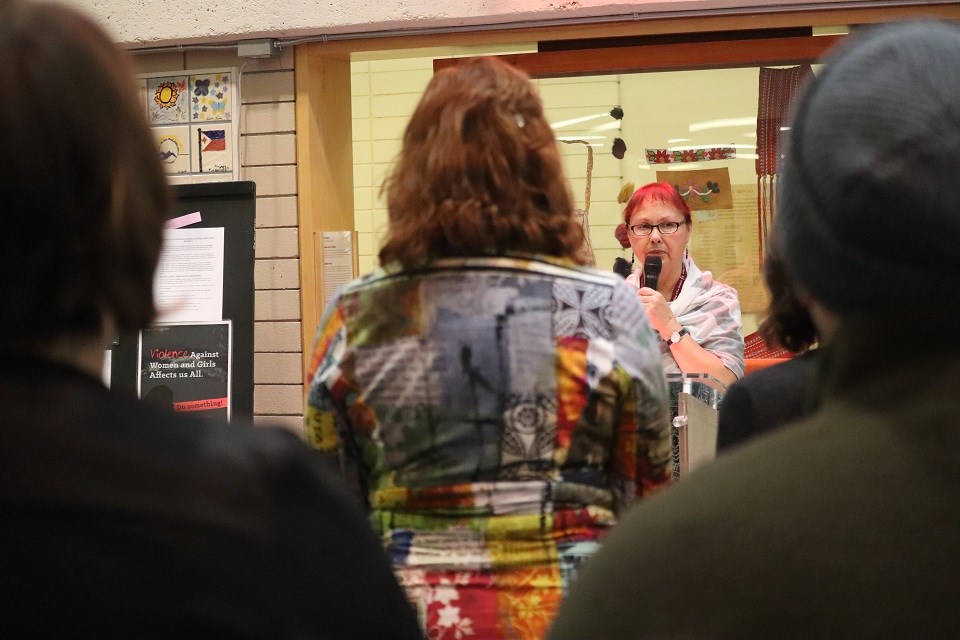On this day, Dec. 6, 1989, a lone gunman constructed what is dubbed the deadliest mass shooting in Canadian history, killing 14 women and injuring several others.
Today at the College of New Caledonia (CNC), dozens of Prince George residents and community members remembered the victims of the Montreal Massacre with a joint ceremony with CNC and UNBC.
Some of the speakers were baffled that even in 2019, the message of ending violence against women needs to be reminded.
“Are we brave enough to speak against this?” asked CNC Instructor Brenda Koller when she spoke at the podium this afternoon, adding it’s the job of the public to speak out against this issue and become allies in the fight for change.
The shooting began at Ecole Polytechnique, where a man walked into a classroom, pulled out a gun, separated the men from the women and killed six women.
He later shot and killed eight more women and injured others for a total of 14 casualties.
A dozen of the female victims were engineering students, two were in nursing programs and one was a staff member.
.@cnc_bc_ca hosts 30-year anniversary memorial for the 1989 Montreal Massacre, the deadliest mass shooting in Canadian history. Dozens have gathered to reflect on the 14 women killed & to say ‘no’ to violence against women | #CityOfPG @PGMatters pic.twitter.com/6EzkQXHwfL
— Kyle Balzer (@KyleBalzer) December 6, 2019
Raegan Cote, CNC student union representative, is also a student of the trades at the post-secondary in the culinary arts, which she says is male-dominated.
When speaking at the gathering, she said the 30th anniversary of Ecole Polytechnique serves as a reminder that women belong in trades programs and that boys should be educated about how they can help combat this issue at a young age.
“Domestic violence can be physical, however, this can often take place in verbal abuse and cause unseen trauma,” she said with notes deriving from a lecture she attended from Dr. Michael Flood, a noted sociologist of gender and equality studies.
“This also includes isolation from friends and family. He claims more women are becoming aware of this, however, what good does it do to send an educated woman home to uneducated men. [...] Violence against women I don’t want to say ‘the fight is impossible,’ but it is extremely hard to do without the help of men.”
Northern B.C. is associated with the Highway of Tears where several Indigenous women and girls have either gone missing or were found murdered.
Marlene Erickson, Executive Director of CNC First Nations Education at CNC, says we must educate ourselves in order to move towards a solution to violence against women.
“As individuals, we must speak out against violence. That we learn the history of Canada and its laws and policies that marginalized and oppressed Indigenous women and women all over Canada. That we need to be strong allies to those who are actively working to break down barriers and that we confront and speak out against racism, sexism, homophobia and transphobia wherever it occurs, in your home in your workplace and in your social circles.”
CNC President Dennis Johnson also spoke at today’s ceremony, saying explicitly that misogyny, as portrayed in the Montreal Massacre, has no place in the Prince George school
“They were killed that day because they were women,” he said.
“It’s something that as both an educator and a father with a daughter currently attending university, I find it comprehensive. From this tragedy, the national movement on violence against women is growing. As a post-secondary institution, CNC has a role to play in this. Our values promote equality and respect. In every aspect of this college, women are respected and valued as members of the CNC community.”
Mayor Lyn Hall also attended and spoke at the 30th-anniversary ceremony, along with several other instructors from CNC and UNBC related to women’s and gender and equality studies.



